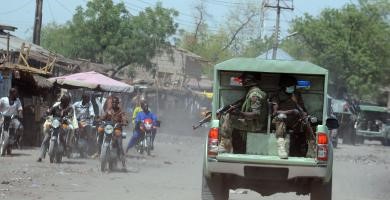 Nigeria is escalating measures to rein in the unrelenting militancy of Islamist group Boko Haram in northeastern Nigeria, but long-standing political issues will complicate Abuja's efforts. On May 14, Nigerian President Goodluck Jonathan declared a state of emergency in the northeastern Yobe, Adamawa and Borno states and deployed roughly 2,000 troops to the region. The reinforcements may succeed in protecting some government and civilian positions. But absent cooperation from northern officials and elites -- many of whom oppose Jonathan and have balked at hints that he may pursue a second term in 2015 -- Boko Haram will likely be able to deflect government counterinsurgency operations and continue its attacks.
Nigeria is escalating measures to rein in the unrelenting militancy of Islamist group Boko Haram in northeastern Nigeria, but long-standing political issues will complicate Abuja's efforts. On May 14, Nigerian President Goodluck Jonathan declared a state of emergency in the northeastern Yobe, Adamawa and Borno states and deployed roughly 2,000 troops to the region. The reinforcements may succeed in protecting some government and civilian positions. But absent cooperation from northern officials and elites -- many of whom oppose Jonathan and have balked at hints that he may pursue a second term in 2015 -- Boko Haram will likely be able to deflect government counterinsurgency operations and continue its attacks.
Boko Haram has sustained an intense insurgency, carrying out frequent attacks on Christians and against police and military targets and political officials. Boko Haram assaults typically kill dozens of people, and the group regularly robs banks and loots weapons depots. But while the insurgency is not abating, it has also not continued to spread beyond the group's ethnic core in northeastern Nigeria.
Consisting mostly of ethnic Kanuris, Boko Haram has conducted few operations in non-Kanuri territories such as northwestern Nigeria, the home of the Hausa-Fulani ethnic group. The Islamist group also has not waged attacks in Abuja, the capital, since mid-2011, and it has never been active in southern Nigeria. Nor has Boko Haram conducted violent operations outside Nigeria, apart from the Feb. 19 kidnapping of a French family on the Cameroonian side of the border with Borno state. (The family was released unharmed two months later, possibly after Boko Haram received a ransom payment.) Thus, while the government has had little success extinguishing the violence, the insurgency has been limited primarily to Nigerian targets and avoided targets that might trigger a powerful international response.
The new security forces deployed to northeastern Nigeria may have an incremental impact on Boko Haram, but previous efforts by the Nigerian government have only temporarily disrupted the group's operations. Its leader, Mohamed Yusuf, was killed by Nigerian forces in 2009, and troops have been deployed in northeastern Nigeria since the late 2000s. The Jonathan administration has also floated a possible amnesty program to incentivize Boko Haram to end the insurgency, but exactly what, beyond amnesty, the government could offer the militants remains unclear.
Tacit Support
The major constraint facing the Jonathan administration is not a lack of manpower or financial resources, but rather the absence of political will to address grievances in northern Nigeria concerning political, social and economic interests. Among northerners, the main issue is Jonathan's possible run for re-election in 2015. Northerners feel that it is their turn to hold the presidency, and a second term for Jonathan would violate the spirit of the power-sharing agreement between the north and the south that has been in effect since Nigeria's transition to democracy in 1999. Jonathan is willing to address most of the north's demands, and he has yet to declare whether he intends to run, but he is not willing to concede the office at this point in his term and become essentially a lame-duck president with limited influence.
As a result, there is little will in northern Nigeria to cooperate with the Jonathan administration's security efforts since doing so would indirectly support his possible re-election bid. Even in non-Kanuri parts of northwestern Nigeria, Boko Haram receives only muted criticism. Instead of working with the government to disrupt the militant group, northern elites typically focus instead on the shortcomings of the Jonathan administration. Local and national officials in the north typically take a hands-off approach to the militant group, though some support Boko Haram with cash and with intelligence tip-offs. Thus, while the additional 2,000 troops may patch over some defensive deficiencies, they will do little to deter Boko Haram as long as the north continues to sit out the fight.
Courtesy : Stratfor (www.stratfor.com)